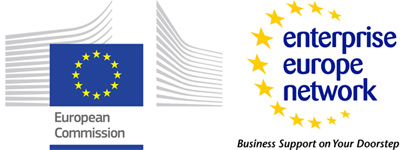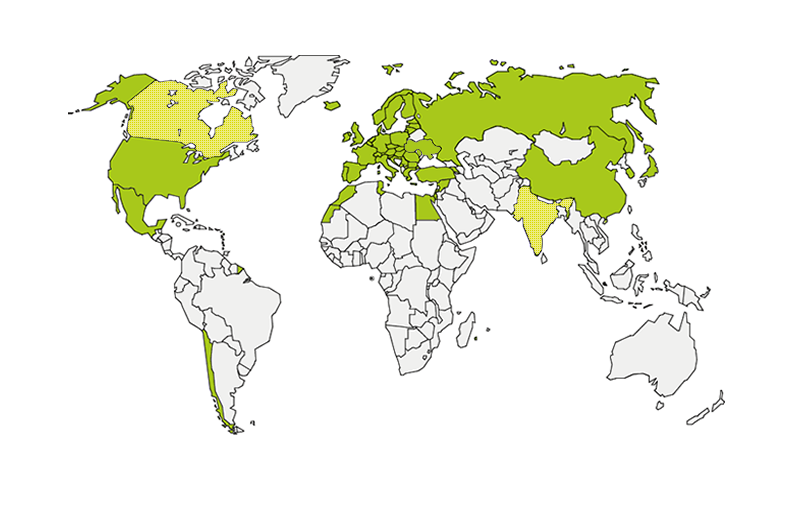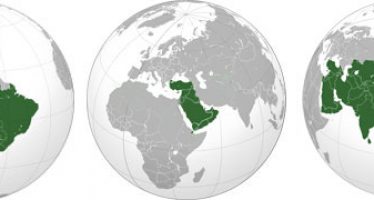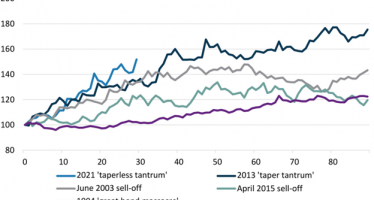European Commission: Helping SMEs Seize Global Opportunities
 The priority for Europe now is to overcome the crisis boosting competitiveness and growth. Fast growing emerging markets such as China, India, Russia and Brazil, with strong growth rates and potential represent significant opportunities for EU companies. Exports outside the EU to expanding markets could trigger new dynamism for European economy. The Enterprise Europe Network helps European small and medium sized enterprises (SMEs) seize these opportunities and take the step into internationalisation.
The priority for Europe now is to overcome the crisis boosting competitiveness and growth. Fast growing emerging markets such as China, India, Russia and Brazil, with strong growth rates and potential represent significant opportunities for EU companies. Exports outside the EU to expanding markets could trigger new dynamism for European economy. The Enterprise Europe Network helps European small and medium sized enterprises (SMEs) seize these opportunities and take the step into internationalisation.
The Enterprise Europe Network is the world’s largest business support network, based in close to 600 local organisations in more than 50 countries. The partner organisations include chambers of commerce, enterprise agencies, regional development organisations, research institutes, universities, technology centres and innovation centres.
The EU-funded business and innovation support network eases the way for companies to start trading abroad, find business or technology partners and access EU funding. Its presence in Europe, the Middle East, Asia and the Americas gives SMEs a foothold in established and emerging global markets.
India is the latest country set to join the Network, with three new centres to start operating in New Delhi. An office will also shortly open in Canada, while four new branches in Shanghai and Nanjing have brought China’s total to 27.
The Network also has branches in southern Mediterranean countries, with eight contact points in place in Tunisia, a longstanding partnership with Egypt and seven Moroccan offices set up recently.
The focus on Africa is conceived to be of mutual benefit for SMEs in the EU and in Mediterranean neighbour countries, where a favourable environment for SMEs and further economic development is essential for political stability.
Other countries to have recently joined the Network include Ukraine, Moldova and Mexico.
Case Study: Ticket to Ride for Tourism Web Developer
 For more than 20 years, Italian SME Editel has been developing websites and applications for corporate clients in the northern Trentino region. Working with an Armenian partner it found through the Enterprise Europe Network, the micro-company is taking its business to the next level.
For more than 20 years, Italian SME Editel has been developing websites and applications for corporate clients in the northern Trentino region. Working with an Armenian partner it found through the Enterprise Europe Network, the micro-company is taking its business to the next level.
Editel, based in the town of Pieve di Bono, caters to corporate clients in several sectors including tourism – for which Russia is a growing target market.
For help finding a business partner Editel turned to the Enterprise Europe Network. Its local branch is hosted by business and innovation agency Trentino Sviluppo. Network business adviser Francesca Azzolini added Editel’s profile and request to the Network’s powerful business matchmaking database. “We can help even the smallest SMEs with international ambitions,” she says.
Many kilometres away, Network expert Ani Khandamiryan of the SME Development Center of Armenia flagged the profile to E-Works, an SME specialised in web design and multimedia for Russian, Swiss and American companies.
Soon after, the companies agreed to cooperate in some projects and develop Russian-language mobile applications.
“Armenia is at the forefront of research, development and production of high technology,” says Editel owner Pierlugi Ghizzi. “Thanks to the Network, we can benefit from this know-how and expand our offer in ways we never thought possible.”
And for E-Works, predicts commercial director Andranik Martirosyan, “this partnership will help us conquer Europe.”
Internationally Active SMEs Yield Better Results
SMEs play a key role in creating growth and jobs. Europe’s 23 million SMEs account for two thirds of jobs in the private sector and around 80 % of new jobs over the past five years have been created by SMEs.
Furthermore, a recent study carried out by the European Commission showed that trading abroad is of major importance for European SMEs and the European economy, given that internationally active firms report employment growth of 7% compared with only 2% for companies that have not internationalised.
There is also a strong relationship between internationalisation and innovation. According to the same study, 26% of internationally active SMEs have introduced new products or services for their sector in their country; for other small businesses this is only 8%.
However, SMEs’ international activities are mostly geared towards other countries inside the internal market and only about 13% of EU SMEs are active in markets outside the EU.
SMEs face particular obstacles to tapping the global market, not least when it comes to access to market information, locating possible customers and finding the right partners. The Network helps SMEs dealing with these challenges.
Case Study: Plugging In to New Connections
 Olympia Electronics, founded in 1979 by a pair of Greek entrepreneurs, has grown into one of the country’s most successful makers of emergency lighting, gas detection and fire alarm systems. Working hand in hand with the Enterprise Europe Network, the electrical and electronics manufacturer is now exporting its products to the world’s largest market.
Olympia Electronics, founded in 1979 by a pair of Greek entrepreneurs, has grown into one of the country’s most successful makers of emergency lighting, gas detection and fire alarm systems. Working hand in hand with the Enterprise Europe Network, the electrical and electronics manufacturer is now exporting its products to the world’s largest market.
High-tech fire-detection system made in GreeceOur dogma is to think globally – act locally,” says Dimitrios Lakasas, Olympia’s marketing manager. “We are now finally selling in the United States with small volumes, the first step towards further penetration.”
Based in the northern Greek city of Thessaloniki, the firm exports to more than 70 countries in the EU, Eastern European countries and the Middle East.
But gaining a foothold in the United States, the world’s largest and most competitive market, posed a huge challenge for the company, a leader in the Greek market for emergency lighting and fire alarm systems.
For guidance it went to the Enterprise Europe Network. Along with 15 other companies from seven other sectors, Olympia signed up for a trade mission to New York.
“There is no substitute for face-to-face contact in the business world,” says Vanessa Vlotides, international affairs director for Network partner, the Federation of Industries of Northern Greece. “This is something the Enterprise Europe Network proactively promotes, drawing on our wealth of resources and contacts.”
The Federation planned the mission with help from the New York-based European American Business Organization, which is also part of the Enterprise Europe Network, and the Greek general consulate.
A meeting between Olympia and a US firm arranged by the Network partners led to an agreement under which the two firms are now selling each other’s products in their respective markets.
Tapping Into World Markets
With branches in 25 countries outside the EU – in Europe, the Middle East, Asia, Africa and the Americas – the Network is well-placed to help European enterprises establish themselves in foreign markets.
The Network encourages SMEs to do business across borders through partnerships and technology transfer agreements. In three years, 4 300 cross-border cooperation agreements were concluded through the Network with a total impact on sales growth estimated at € 450 million. Participating firms created 2 400 new jobs.
The partner organisations have access to two powerful databases: one for business partnerships and one for technology transfer. Company profiles and offers are inserted into the databases and made available to the whole Network. Local offices use the databases to search for the right match for their clients and then help them to link up. The databases contain more than 23 000 profiles.
In addition, the Network organises brokerage events to bring companies together.
Network experts also help SMEs facing complex issues such as compliance with foreign laws, for example mandatory rules of contract law, customs rules, technical regulations and standards, managing technology transfer and protecting intellectual or industrial property rights.
Opening the World for SMEs to Enhance EU Growth and Jobs
The sources of growth are changing rapidly in the world economy. The emerging market economies of Asia and Latin America are likely to more than double their output up to 2020, outpacing the growth of the more developed economies.
As part of the EU strategy for supporting SMEs in international markets, the European Commission launched in December 2011 a series of business diplomacy visits labelled “Missions for Growth”, aimed at fostering industrial cooperation and business relations with fast growing emerging international markets and helping EU businesses, especially SMEs, to make the most of global opportunities.
On such visits the Commission delegation is accompanied by European representatives of European companies, industrial sector associations and horizontal business associations from all main industrial sectors.
The visits usually include a series of high-level political meetings, promoting policy dialogue for improving industrial and business cooperation, so as the organization of business to business meetings, where EU entrepreneurs will describe their profile and manifest their interest in order to be matched up with business representatives of the host country.
With branches around the globe the Enterprise Europe Network contributes to the business to business matchmaking events organized in the frame of the Missions for Growth, mobilizing European SMEs to participate and making use of its contacts and well developed tools to cooperate with the business organizations in the targeted countries.
So far, Missions for Growth have been organised to Brazil, Argentina, Chile, Uruguay, USA, Mexico, Colombia, Egypt, Morocco and Tunisia. Future planned Missions include Russia, China and India.

The Enterprise Europe Network was set up by the European Commission’s Enterprise & Industry Directorate-General and is managed by the Executive Agency for Competitiveness and Innovation.
To find the Network near you, visit ec.europa.eu/enterprise-europe-network
To find out more about Missions for Growth, ec.europa.eu/enterprise-europe-network /events/missions-growth
You may have an interest in also reading…
2012 CFI Top 100 Emerging Markets Companies’ Nominations
The 2011 CFI Top 100 Emerging Market Companies were compiled by using the nominations and the votes from CFI’s subscriber
Abu Dhabi Global Market: MENA’s Leading, Digital-First International Financial Centre, A Catalyst for Economic Growth
Over the past decade, Abu Dhabi has put a focus on gaining recognition for the United Arab Emirates as a
A Possible Tug-of-war Between the Fed and the Markets
The projections for United States GDP released by the Federal Reserve on March 17, pointed to a growth rate of



















































































